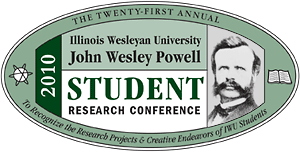Submission Type
Event
Expected Graduation Date
2010
Location
Ames Library, Illinois Wesleyan University
Start Date
4-10-2010 9:00 AM
End Date
4-10-2010 10:00 AM
Disciplines
Education
Abstract
The "English Only" sentiment of the recent past has had traumatic effects on the native language abilities of many Hispanic students in the American schooling system. While their Engfish comprehension continues improving, their Spanish comprehension continuously declines and leaves them unable to access a huge part of their identity (Potowski, et ai., 2009). I noticed this issue while teaching Spanish for Native Speakers (SNS) courses at an urban high school during the fall of 2009, which motivated me to engage in a self-study. This study was designed to implement various strategies, which worked with native language speakers' unique needs and background knowledge, with specific implications for literacy enhancement and cultural enrichment. In analyzing the results of these strategies and my own journal entries, advancements in both native language ability and a broader cultural understanding were noted. These results contain important clues into offering Hispanic high school students a curriculum that works specifically with their needs to help them become bilingual and culturally aware adults.
Included in
Supporting Native Language Literacy and Culture Among Hispanic High School Students
Ames Library, Illinois Wesleyan University
The "English Only" sentiment of the recent past has had traumatic effects on the native language abilities of many Hispanic students in the American schooling system. While their Engfish comprehension continues improving, their Spanish comprehension continuously declines and leaves them unable to access a huge part of their identity (Potowski, et ai., 2009). I noticed this issue while teaching Spanish for Native Speakers (SNS) courses at an urban high school during the fall of 2009, which motivated me to engage in a self-study. This study was designed to implement various strategies, which worked with native language speakers' unique needs and background knowledge, with specific implications for literacy enhancement and cultural enrichment. In analyzing the results of these strategies and my own journal entries, advancements in both native language ability and a broader cultural understanding were noted. These results contain important clues into offering Hispanic high school students a curriculum that works specifically with their needs to help them become bilingual and culturally aware adults.


